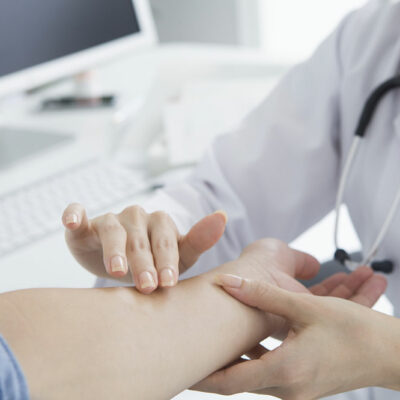Signs and management options of premature menopause

Early (or premature) menopause happens when a woman’s periods stop before the age of 45. It can occur naturally or be a result of certain treatments. It is generally diagnosed through blood tests and a physical examination to rule out other conditions like pregnancy or thyroid disease. The tests are used to measure estradiol and Follicle Stimulating Hormone (FSH) levels, which indicate the onset of ovary failure and estrogen production levels, respectively.
What are the physical symptoms of premature menopause?
The main symptom of early menopause is periods becoming infrequent or stopping altogether without any other reason. Other physical signs may include:
- Hot flushes
Sudden feelings of hot and cold in the face, neck, and chest, which can make one feel dizzy. - Difficulty sleeping
This may result from night sweats, making one tired and irritable during the day. - Palpitations
This occurs when the heartbeats become more noticeable.
Other premature menopause signs
- Headaches and migraines that are worse than usual
- Muscle aches and joint pains
- Changed body shape and size
- Skin changes, including dry and itchy skin
- Recurrent urinary tract infections (UTIs)
- Reduced libido
- Vaginal dryness, pain, itching, or discomfort
What are the mental health symptoms of premature menopause?
Common mental health symptoms of early menopause and perimenopause include:
- Problems with memory and concentration or brain fog
- Changes to mood, like low mood, anxiety, mood swings, and low self-esteem
What causes premature menopause?
In some cases, early menopause may be triggered by:
- Premature ovarian failure
While the cause of premature ovarian failure is often unknown, it may be a result of chromosome abnormalities, an autoimmune disease, or infections like tuberculosis, malaria, or mumps. - Cancer treatments options
Radiotherapy and chemotherapy may cause temporary or permanent premature ovarian failure. This risk is higher amongst women who have received radiotherapy around the brain or pelvis. - Surgical removal of ovaries
Surgically removing both ovaries (during a hysterectomy, for instance) can increase the risk of premature menopause.
How is premature menopause treated?
After diagnosis, doctors may prescribe a combined contraceptive pill or Hormone Replacement Therapy (HRT) to make up for missing hormones. This is recommended until the natural age of menopause (51 years on average) to protect against osteoporosis and other conditions that may develop post-menopause. Doctors may also recommend other treatment options and lifestyle changes to best protect one’s health.










